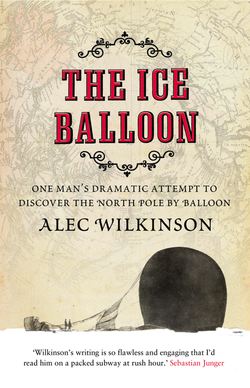Читать книгу The Ice Balloon - Alec Wilkinson - Страница 7
3
ОглавлениеWhy did they go, then, this parade of fanatics heading for the deep places? You have to wonder. What they did was so extravagant that their impulses can’t be assumed to have been those of an ordinary citizen, even allowing for the differences between our period and the ones they lived in. It is no observation of my own that the nineteenth century was the last to have been receptive to the enactment of myths, to see the footprints of larger, ineffable beings laid out like dance steps on the map and to feel them wandering through their art and writing. The last to pursue their models and outlines and to feel the rightness of embodying them. Selfless heroism, and the public pursuit and praise of it, reverberates throughout their centuries. The walls of the known, the boundaries, were closer at hand. It was as if the restraints that men felt in sociable life made them feel compelled to rush into the wild.
Who were they? Not a single type but a multiplicity. A procession of thrill seekers, god chasers, romantics, pragmatists, visionary dreamers, nomads, criminals hiding where they thought no one would look, withdrawers from more complicated lives, penitents, mourners, long-shot followers, defeated characters hopeful of redemption, careerists, misfits, and malcontents ill at ease anywhere but the solitary places. Add to them brooders. And self-testers, anxious and feeling vital only when facing a challenge; men whose neurology was sufficiently deadened that only the most profound experiences could stir them. Upright men who adhered courageously to the highest codes of conduct, while marked for death. Devious men who took money from patrons to find Franklin when their intent was to get to the Arctic to find the pole. Ambitious men avid for attention and profoundly receptive to impulse. They set themselves a forbidding task, and came back or didn’t, the way heroes do in legends, and in children’s books, too.
Very few of them were adequate self-explainers. Someone responding to intuition, to chance and fortune, to sudden insights and epiphanies, often can’t explain himself well. Such people act because the gesture feels right, or because they feel provoked, convinced by the obscurity, the persistence, and the vitality of their desires, the self-persuading and incontrovertible correctness of something they see in a vision. “The history of polar exploration is a single mighty manifestation of the power of the unknown over the mind of man, perhaps greater and more evident here than in any other phase of human life,” one of them, Fridtjof Nansen, a Norwegian, wrote.
No explorer says, I’ll go a little farther than the one who went farthest. He declares for the pole or its equivalent, and he breaks down and turns back or dies sometimes just short of, or just past, where the last mark stood—sometimes merely from luck, bad weather, poor planning. And sometimes determination and a rigorous constitution assert themselves in the vacuum created by hopelessness.
“At least I shall have made my mark on the world,” Adolphus Greely, an American explorer, wrote, before leaving on a journey that had a hideous outcome. Nansen’s explanation was drawn from that part of the landscape where romance and mysticism merge. During the Arctic night, aboard a ship stuck in the ice, he wrote, “What demon is it that weaves the threads of our lives, that makes us deceive ourselves, and ever sends us forth on paths we have not ourselves laid out, paths on which we have no desire to walk? Was it a mere feeling of duty that impelled me? Oh, no! I was simply a child yearning for a great adventure out in the unknown, who had dreamed of it so long that at last I believed it really awaited me; and it has, indeed, fallen to my lot, the great adventure of the ice, deep and pure as infinity, the silent, starlit polar night, nature itself in its profundity, the mystery of life, the ceaseless circling of the universe, the feast of death, without suffering, without regret, eternal in itself. Here in the great night thou standest in all thy naked pettiness, face to face with nature; and thou sittest devoutly at the feet of eternity, intently listening; and thou knowest God the all ruling, the centre of the universe. All the riddles of life seem to grow clear to thee, and thou laughest at thyself that thou couldst be consumed by brooding, it is all so little, so unutterably little…. ‘Whoso sees Jehovah dies.’”
Spoken straight from the unconscious, which is wild and ungovernable and used to be called the soul.
